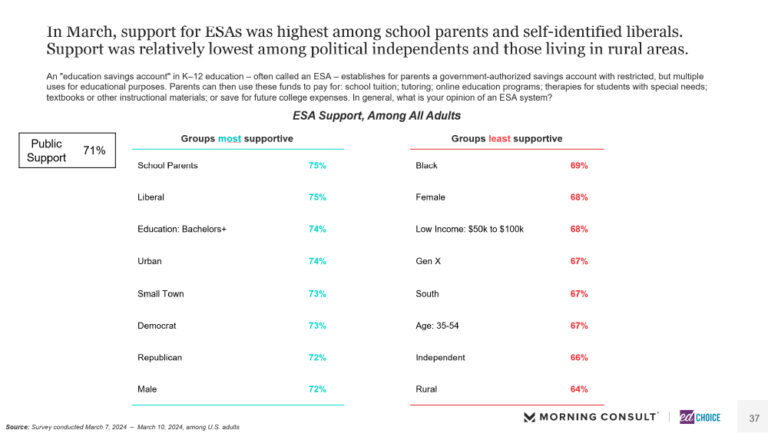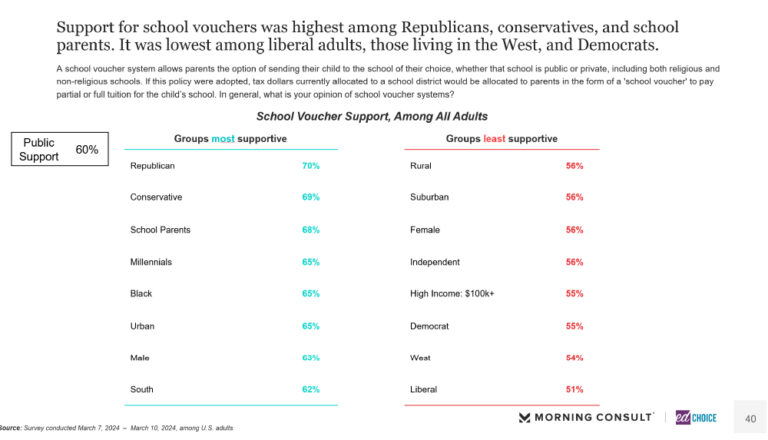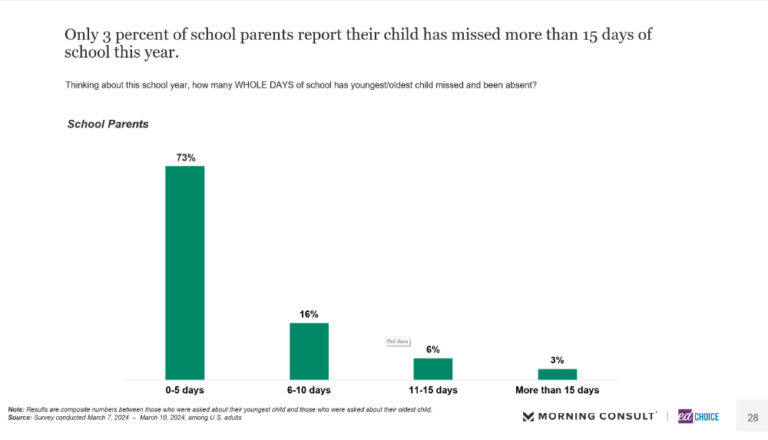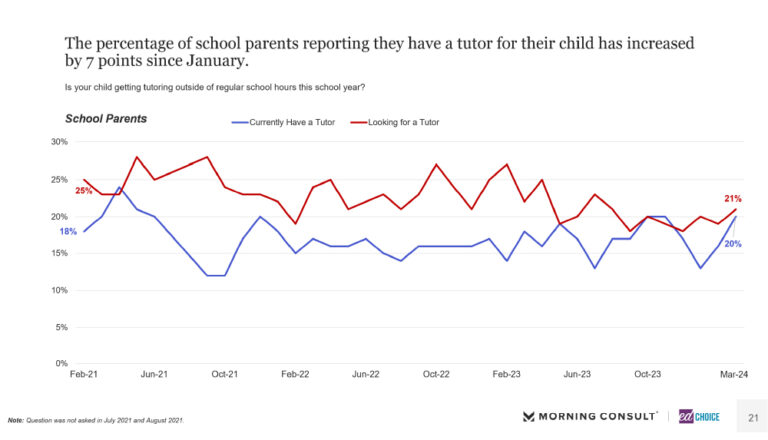New Polling Shows Parental Support for School Choice Policies Remains Strong in 2024
Last month, Alabama Governor Kay Ivey signed the CHOOSE Act into law. The CHOOSE Act will establish a new tax-credit education savings account that will become available to every Alabama family by the 2027-28 school year. The CHOOSE Act is the first universal educational choice program of 2024.
With all the new private school choice programs that have been established over the past several years, the support for such programs from the American public and parents, specifically, could be presumed. It’s true, support for school choice policies like ESAs and vouchers is quite strong and has been for some time. It’s worth checking in, however, to see the popularity of school choice policies as we move through 2024.
In partnership with Morning Consult, EdChoice surveyed a nationally representative sample of American adults 18 and older (N=2,252) from March 7-10, 2024. With additional sampling, we obtained responses from 1,302 parents of children currently in K-12 education.
In addition to questions looking at school choice policies, we also asked the general public and parents about topics like absenteeism, tutoring, and much more. Here is what we learned:
The majority of Americans support ESAs and vouchers.
Support for ESAs (71%) and vouchers (60%) among Americans remained steady in March. Only 10 percent and 25 percent of Americans oppose ESAs and vouchers, respectively. Parents’ support for these policies is even stronger. ESA support is not only strong, but diverse. For example, 73 percent of Democrats support ESAs, while Republican support is right behind at 72 percent. Both urbanites (74%) and Americans living in small towns (73%) are towards the top in terms of ESA support.

Voucher support is a bit more spread out. Even still, the majority of Republicans (70%) and Democrats (55%), as well as urban (65%) and rural (56%) respondents, support vouchers. Voucher support among parents increased slightly in March, as well. Less talked about, but still important, forms of school choice like charter schools and open enrollment also draw high levels of support from the general public and parents. Nearly 80 percent of parents are favorable towards open enrollment, while 70 percent of parents support charter schools.
 What are parents saying about chronic absenteeism?
What are parents saying about chronic absenteeism?
Chronic absenteeism has been a heavily discussed topic in the last year, and for good reason. In a recently released story in the New York Times, data from states like Alaska, Oregon, and Nevada revealed staggeringly large percentages of students were chronically absent in 2022-23. Are parents seeing this trend? When asked how many whole days of school their child has missed, only 3 percent of parents reported their child missed more than 15 whole days of school this year. Nearly three in four parents said their child has missed 5 or fewer whole days of school, while 22 percent said their child has missed between 6 and 15 whole days of school.
 How much weight should be assigned to these findings from parents? Is there a chance parents are underestimating or underreporting their child’s absences? A recent article from Brookings makes the claim that the big disparity between the survey data from parents and the state- and national-level data of absences is more likely to stem from caretakers underestimating their child’s absences rather than intentionally underreporting absences. The survey data from this report is aligned with the survey data mentioned in the Brookings article, that is – parents are pretty unlikely to report their child missed more than 15 whole days of school last year. It’s worth questioning, especially considering the data from EdChoice’s survey of American teenagers last month1. In that report, 13 percent of teenagers self-reported missing more than 15 whole days of school in the prior school year. That is a massive gap in what parents are saying compared to what teens are self-reporting. The data from the teens survey appears to echo more closely what the alarming state and national level data are reporting about chronic absenteeism.
How much weight should be assigned to these findings from parents? Is there a chance parents are underestimating or underreporting their child’s absences? A recent article from Brookings makes the claim that the big disparity between the survey data from parents and the state- and national-level data of absences is more likely to stem from caretakers underestimating their child’s absences rather than intentionally underreporting absences. The survey data from this report is aligned with the survey data mentioned in the Brookings article, that is – parents are pretty unlikely to report their child missed more than 15 whole days of school last year. It’s worth questioning, especially considering the data from EdChoice’s survey of American teenagers last month1. In that report, 13 percent of teenagers self-reported missing more than 15 whole days of school in the prior school year. That is a massive gap in what parents are saying compared to what teens are self-reporting. The data from the teens survey appears to echo more closely what the alarming state and national level data are reporting about chronic absenteeism.
Can tutoring be the antidote for rising rates of chronic absenteeism?
According to a new study from the National Student Support Accelerator at Stanford University, D.C. students participating in high-impact tutoring (defined as tutoring lasting at least 90 minutes per week with the same tutor, spread over multiple sessions) were less likely to be absent on days they had tutoring scheduled.
While the research and policy world are optimistic about these findings, how do parents feel currently about the idea of tutoring for their child? In March, just over 40 percent of parents indicated they are having their child tutored or are interested in finding a tutor for their child. That represents a 6-point jump from February. Split out further, the percentage of parents reporting their child is currently getting tutored has jumped 7 points from January. Looking at the demographics of those parents using a tutor or that are interested in finding one, Hispanic parents and special education parents are at the top of the list at 64 percent and 63 percent, respectively. Rural (26%) and Gen X (27%) parents are the least likely groups to say they are using a tutor or interested in finding one for their child.

Editor’s Note: Stay tuned for the full release of our latest report teens polling report next week.




